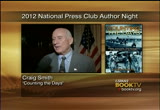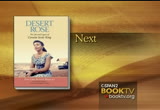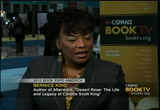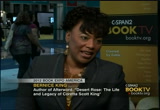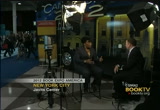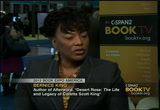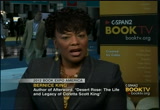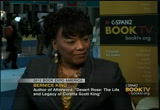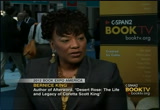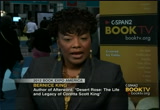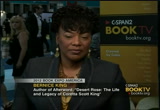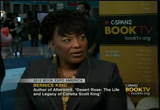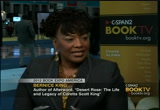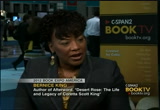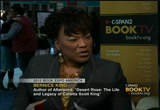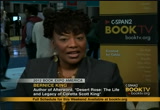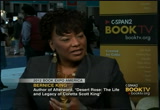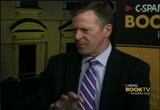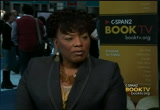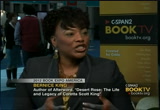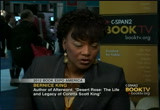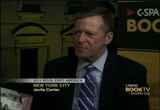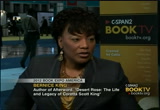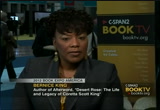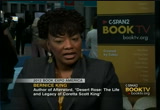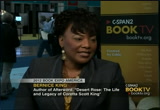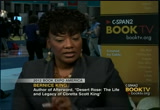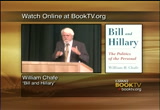tv Book TV CSPAN January 22, 2013 12:30am-1:00am EST
12:30 am
persuaded them the other way and the guys that i write about for example decided after a couple of years in the camp they wanted to be part of rebuilding japan. they knew the war of -- they were going to lose the war. >> we are talking with craig smith author of "counting the days" pows, internees, and stragglers of world war ii in the pacific published by smithsonian books. thank you very much. >> thank you very much. >> now bernice king the daughter of civil rights leader martin luther king jr. and coretta scott king discusses the recently published biography of her mother. desert rose the life and legacy of coretta scott king. she talked with booktv at bookexpo america publishing's annual trade show. this is about half an hour. >> bernice king who is edith scott dagley?
12:31 am
>> guest: at edith scott bickley -- coretta scott king was the wife of martin luther king jr. -- cohost land your mother. >> guest: yes my mother so she was my aunt. she and my mother grew up in alabama together and she later became a drama professor. in fact she founded the drama department at the state university. she was a very lively woman and unfortunately passed last year in june. after completing this book. >> this book is desert rose the life and legacy of coretta scott king and the author is your aunt eva scott dagley? when did she write this book lacks. >> guest: well it was a journey that began with my mother's requested 1966 to write
12:32 am
her story. at that time both of my parents were constantly being threatened. my mother was concerned one that her story be told and she wouldn't be lost in it -- come wanted people to know that she was not just the wife of martin luther king and the mother of his children but she in fact played a vital role in the movement and was an activist before she met martin king. she encouraged it from that angle as well as wanting to tell the stories of women in the movement. we don't hear a lot about the women of the civil rights moment -- movement. she set out to write it and 68 april 4 she put the manuscript in the mailbox and that was the evening my father had been assassinated. at that time she put aside the process and came to atlanta to help my mother out with a
12:33 am
funeral arrangements and then with us the children were the first couple of years. and helping my mother with the establishment of the king center. at that time my mother said maybe i want to write my own life story. she proceeded to do that and publish that in 1969 and is no longer in print. in 2004 because mother had encouraged it in 66 and she knew about it she still wanted her to complete a she said what you go ahead and complete the manuscript in 2004? of course she began to do more work. as a result a few months or a year later my mother became ill. so she couldn't really focus. my mother passed in 16 months later my sister passed so it was delayed somewhat that by 2008 and close 2009 she started
12:34 am
completing this particular book. i had a conversation with her one day. she was working on it and she said people need to know more about coretta. martin did not make coretta. they need to know coretta king from the strong family roots, the strong family that was deeply grounded in faith that our education and how it prepared us as women to be leaders and the fact that your mom was very much an activist involved in the peace movement and they need to know about her. and i said i'm working on this book. i said can i help you? get it published? this is how the journey began. >> host: bernice king your mother come to how active bushy and when did she begin her activism? was born in marion alabama? >> guest: ironically if you study history three of the leading persons in the movement ralph abernathy and my father
12:35 am
i'll had wives from carrie county alabama. how ironic is that and mom did not know of one data abernathy. when the movement started they didn't know about them marrying different men in all of that kind of stuff and have brought it all together. and so growing up there in rural alabama with the father who was an entrepreneur or entrepreneur or leon and unheard of as an african-american had his own truck. he hauled lumber. he did open a sawmill and it was burned down by a white gentleman he hired. he would not let that stop them. implements a separate father's determination to stand up to injustice and continue to move ahead with courage really influenced her. then she went on to a school called lincoln school that produced a lot of socially active leaders in our nation.
12:36 am
missionaries came and educated children to become more socially minded, to think about the world they lived in. that began the early activism inherent piqued her interest in why am i here and what is my purpose? from that point down she was purpose-driven in by the time she got to antioch she became involved in the naacp the progressive political party in the peace movement. she was involved in the police movement well in advance of daddy speaking out on the war in vietnam. >> host: this public image of your mother is behind-the-scenes, quiet. >> she was a quiet storm. [laughter] >> host: what was she like as a person? >> guest: she was very issue driven. she had a gentle spirit and the thing that i like to say about her the most is she exuded the
12:37 am
unconditional love of god like nobody ever knew. i didn't know my father's will because i was only five when he was assassinated. she satel mail the time i don't hold grudges and for a woman to experience all the she experience from being in the the house when it was bombed in 1956, that is the time where all kinds of emotions can be aroused and hate and hostility and bitterness. she had no an emotional bitterness. only love and understanding and goodwill and hope and faith and she loved him in spite of it and did not let that hinder her work. so i lived with that constantly so you can imagine the children hearing about her father being assassinated. i'm five and my sister 10 and
12:38 am
brother 12. little kids whose death has been taken away that way you can become very hateful. my mother taught us about love and your father lived for a good cause. we don't hate people so i lived without example in the home. and it was exuded throughout this book if you read her story. >> host: where did you come up with the title desert rose? >> my aunt gave me the title. they obviously grew up in very harsh and difficult circumstances. it was the site itself and it was difficult for african-americans to succeed and to thrive and yet through my mother's faith and education and family upbringing kind of like difficult circumstances. she nonetheless had the -- to push forth and blossom into this beautiful, courageous devoted and dedicated graceful
12:39 am
determined and committed mission minded woman. that is how my and came up with the top -- title. >> host: bernice king what do you remember when you are five years about april 4, 1968? >> guest: actually don't remember april 4 at all. i was told i was asleep by the time the news got to atlanta. he was killed around 7:00 p.m. atlanta time. and so they were putting me to bed. the next day when my mother went to get my father's body and bring him back to atlanta she knew, i have got to explain to bernice what is going on. she told me that you know my father would no longer be able to speak to me. he has gone home to live with god. and of course kids, i didn't say
12:40 am
anything immediately. we went to the airport and got on the plane and i heard this noise. i guess it was the wind. and i said comcast i hear him back there breathing. she told me that he was going to be in a casket like he is asleep but he won't be talking. i said i hear breathing. she said no, know that's not him. later on i asked her, how is he going to be? i remember daddy being home at the dinner table. i remember him reaching for these long stemmed onions with the at the ends and he would pick it up and chew it like celery. i just remember that. it's embedded in my mind. i wanted to know how he was going to be. she said god is going to take care of him. and i remember the funeral. it was hot. a lot of lights, a lot of
12:41 am
cameras and i said it's so hot in here. what are all these lights and cameras? the most startling thing for me was when it was time to do the eulogy. they had decided to play it my father sermon from debray for 1967 he delivered at ebenezer baptist church two months before his assassination. tell them i don't want a long funeral. that is what he used to say. i was the drum a drum major for the justice of the peace -- they play that excerpt. i remember my mom said u.k. he can't speak anymore to you. he can't talk. suddenly i am looking for my dad. looking at the casket to see this voice is going to come out. a child knows there's father's
12:42 am
voice. and she just try to put her arms around me and comfort me. that was kind of eerie. >> host: did your older siblings get it more than you did? >> guest: oh yeah definitely. my sister used to say he is my buddy. he found comfort in coming home to us. they used to play basketball in the house and my mom didn't really like that. but he enjoyed us. and for her they talked a lot. it was a great loss for her and martin to third who carries his name is the same thing. he and my brother dexter a few weeks before he was assassinated got a chance to travel into rural is a tzipi. at that time daddy was looking at the poor people's campaign and was doing a little recruiting in the south. they got a chance to spend that intimate time with him doing the work that he did. so it was very traumatic for all
12:43 am
of us in different ways. i remember my dad used to come home off the road. i would run up into his arms and he with me up and say okay we are going to play the kissing game. i said okay. i was all happy that daddy was home. he said okay where is -- he called them sugar spots. where is moms sugar spots? my sister's nickname was joking in my brothers nickname was marty. i remember my spot being on the forehead. my mother seems to remember it being on the cheek. but i did the game. so i remember the forehead. >> host: how did your mother's life changed after your dad was assassinated? >> guest: a change drastically although my mother was working side-by-side in my father's movement in fact she wanted to
12:44 am
be a -- and was preparing for that when they met. she had to wrestle with her calling and purpose but her sense of mission to want to change the conditions that lex had to live under and daddy tutu obviously she decided to surrender and so during the movement she had a wonderful opportunity to use that career, that talents to raise money. between her doing concerts and some forget from time to time and organizing his papers in the last years, she still found time but once he was assassinated i didn't get to see my mother my mother as much as i would have liked to. >> was she gone a lot more? >> she was gone but she was busy. so the things we may have done as daughter and father that did
12:45 am
not take place. the hours that mothers and daughters do that did not take place. she was focused on institutionalizing his legacy. she thought americans need to understand the very thing that made significant tzipi movement which was us hold non-violent philosophy influenced by jesus christ and mahatma gandhi. she built the king center in atlanta and put her heart and soul in that and galvanize people to support it, began teaching to non-violent institutes and scholarly programs. her focus shift did as they raised the money debt free when we opened the first day. debt free at the king center. then she focused her attention on the holiday. you can imagine -- i'm in the
12:46 am
bedroom sometimes at home and she is on the phone talking to presidents and prime ministers. my mother was phenomenal. she knew how to shift and adjust it any minutes notice. she had to talk to a president or someone in the home who was helping her out or in everyday ordinary person somebody who worked with her at the king center. she loved to entertain. she invited people to the house from time to time and had little parties. if you came over she was going to fix you some of her favorite vegetable soup. and then proceeded to tell you about this movement she would light up. talking about the movement and got excited about it. i lived -- i couldn't understanunderstand it. you all lived under such threat but for her that was the feeling. this was the reason that my life has gone the path it has gone
12:47 am
from perry county to lincoln school to antioch. >> bernice king did your mother and family stay in the same house? >> after daddy was assassinated we stayed in the same house. in fact the house was not purchase until 1966. my father did not want to own anything. he was struggling with all of that so she said you can have a wife and children. they always talked about the fact that one day he probably would die tragically and in fact president kennedy to talk about how that's going to be my fate. shiites anticipated that. she made sure he bought the house and stayed in the house until 2004. >> host: did you have grandparents around growing up? either your mother's side or your father syed? >> i very much did.
12:48 am
i visited my grandparents in alabama every sunday and every summer for two weeks and spent time with my grandfather. i would help my grandmother -- i did not cook but i helped her around the dinner table setting up the table and washing the dishes and watching her cook. we would sit at the table and have long family discussions. so i spent a great deal of time with my grandparents. summers alternatively and thanksgivings and christmas and then my father's parents come guy was very close to them. they lived in atlanta so i saw them every week practically. they were very influential in my life. >> host: after your dad's assassination or even before did you have security around your family at all times? >> initially we did. for the most part come to know. there was one time when james
12:49 am
earl ray escaped from prison we have to have security. i remember going to school thinking this is really embarrassing to have these folks around. they didn't come in the classroom. they sat outside in their cars but it was kind of uncomfortable i didn't understand all of this, the magnitude of who my father was and who my family was or anything. other than that, we never had security. my mother had an atlanta police officer assigned to her after some years so she had that until her death. >> host: she has somebody with her at all times? could she go to a store quick shoot -- could she go anywhere without being stopped? >> guest: a few times they would get on her about it that no, that is what i was saying. i never had an opportunity to go shopping with my mom. the couple of times that i can
12:50 am
remember we got stopped at every turn in the mall. people would want autographs and bond pictures. she didn't do it a lot because it came -- we did more dinners at restaurants as families because you do get private areas but even in some instances where we didn't people would invariably come up and say can we get an autographed? it was very difficult to really go out. she probably did more when she went on vacations away. she would go to the source if they would have there but i will tell you one story i remember that i loved. this was in my latter years. i went to the hallmark store with her couple of times. >> host: home are? >> guest: hallmark. my mother is busy as she was literally spent two or three hours at a hallmark store reading through cards come for making sure was the exact card
12:51 am
for the person. she without thoughtful. the first time i went with her i watched her. she had a list two months at a time. lets take march and april. she would look at the list and she would say a want you to get a card for these people. i started looking and thinking about the relationship she had with the person in the type of person she was to get the right card and take a factor in letter read it. i got it right a few times but i was just impressed. they send their people to get the function done. she was very thoughtful and considerate. for many people that is why there were such an outpouring of her home. she had touched so many people personally. >> host: is there an the irony in the fact that desert rose the life and legacy of coretta scott king was published by the university of alabama? >> well yes.
12:52 am
mother being from alabama but much of the movement was concentrated in alabama. that is one of the things. we remember george wallace standing in locking the doors at the university of alabama to keep the black students from coming in. the alabama but basically told martin luther king, jr. or try to run them out of alabama agitators disturbing the peace for instance in birmingham now the book about mom's life who is from alabama and dad's life together is now being published by the university of alabama press. and i will tell you the greater irony. on june 11, is when george wallace locked the doors and what year was that?
12:53 am
>> host: 63? >> guest: i think it was 63 but the irony is that it was the day he had gotten back and pass. and edith the author of the book or go. >> host: what was the last conversation you had with your mother? with your mother? >> oh wow. i don't remember literally my last conversation. my mother had a stroke in august of 2005. from that point forward she didn't talk a lot. i was with her when she passed in 2006. i don't remember the exact commerce haitian. i remember the sunday before. she have the stroke on a tuesday. i was in the bahamas and i
12:54 am
called to let her know that i had gotten and was checking on her to make sure she was okay. she had a minor stroke two weeks before that coming tuesday. so i was checking to make sure everything was okay and i asked if she signed the paperwork. at that time we were trying to make sure i got on her bank account. she had signed the paperwork and that was our last real conversation. i said i will give you call on tuesday. she have a stroke on tuesday. the rest is history so the rest of my conversation was her saying a few words here and there. >> host: bernie's king but he stays? >> guest: i am the ceo of the king service the same institution my mother founded and we are in the process of expanding our educational platform so it can be more available on line as well as curriculums that can be infused
12:55 am
in the school system. because you know her mission was to get nonviolence and to our society so it becomes a way of life. i think the only way to really do that is through the educational system and young people. that is the mandate of the king center to help bring about this beloved community that daddy talked about by teaching people to educate them in the philosophy and methodology of nonviolence that he taught at lipton also develop in the same spirit of dr. king. that is what i'm doing at the king center and we are in the process of getting a whole new facility that will be more interactive so when young people come it will be like a social -- socially conscious disney experience. when we leave there it will be like you are in attain but you will be inspired and educated at the same time.
12:56 am
>> host: is at the knees are still a baptist church? >> guest: there are two locations the historic heritage sanctuary which was just restored and reopened last april where people people can comment to her. it sits right next to the center. mother made sure she placed the king center in that community to preserve that community. it was a very driving community for african-americans back in the early 20s, 30s, 40s and 50's and they were in the process of demolishing many of the homes there. one of them was my father's birth home but because of my mother's vision to place us under their end to save that birth home and other homes have been saved as a result in the community and it's in a much better place because of that. at ebenezer historic is there and the new sanctuary under pastor raphael warnock is a
12:57 am
private congregation. in fact they have a community resource center named after my grandfather who was pastor of ebenezer for 44 years. >> host: we have been talking here on booktv with her knees king who is the daughter of coretta scott king. this is a book written by her aunt eva scott vaguely sister of coretta scott king and push through publication by bernice king. there is an afterward by ms. king. desert rose the life and legacy of coretta king scott. >> one of the things when you
12:58 am
learn about people in that kind of family dynamic is that a childlike del quintin begins to feel like he has the responsibility of bringing healing to that family and of redeeming and creating honor for there is dishonor. he basically sets out to be a person who is going to rescue the family. he's an incredible student. he is the front of his class. he becomes active and boys nation which is kind of the junior american league. gets nominated to go to washington as the candidate for u.s. senate. he goes to washington and he is already six feet tall. he strides to the front of the line when they go to the white house to see president kennedy and when kennedy finishes his speech bill clinton lopes forward and gets his picture taken alongside of john f. kennedy. he is so proud. he already is dedicated to the idea that he is going to be the
12:59 am
person who is going to bring complete honor to the family. by the age of 17 he is planning to be elected at turner -- eternal jenrry -- attorney general. this is something that everyone knows him knows about because he talks about it all the time. he goes to georgetown and from georgetown he becomes the office candidate for the rhodes fellowship and goes to oxford. he is an incredible success everywhere but he cannot have a sustained ongoing relationship with a woman. he is attracted to the kind of women his mother are the beauty queens who are flirtatious and attractive. that is really where his eyes have been. until he comes back to yale law school. there he meets hillary them. >> you can watch this and other programs on line at booktv.org.
131 Views
IN COLLECTIONS
CSPAN2 Television Archive
Television Archive  Television Archive News Search Service
Television Archive News Search Service 
Uploaded by TV Archive on

 Live Music Archive
Live Music Archive Librivox Free Audio
Librivox Free Audio Metropolitan Museum
Metropolitan Museum Cleveland Museum of Art
Cleveland Museum of Art Internet Arcade
Internet Arcade Console Living Room
Console Living Room Books to Borrow
Books to Borrow Open Library
Open Library TV News
TV News Understanding 9/11
Understanding 9/11